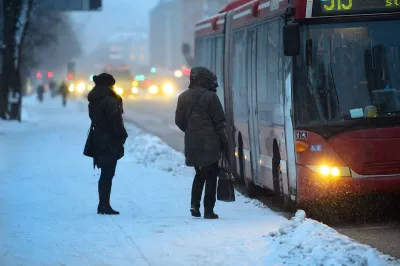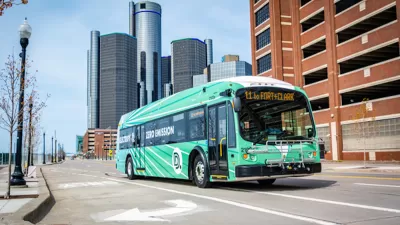Unsurprisingly, people are less likely to use transit during extreme weather events, which are becoming more common around the country.

Extreme weather contributes to a drop in transit ridership, a new study reveals, showing that “America needs to better climate-proof its transit networks and encourage more people to choose shared modes now.”
As Kea Wilson explains in Streetsblog USA, “A recent study of 43 major U.S. transit networks revealed that ridership dropped during long stretches of rain, heat, or other prolonged extreme weather events that scientists link to climate change, at least in the 17 years between when the National Transit Database began collecting stats and 2019, the last year before the pandemic decimated ridership.”
As extreme weather events become more common, this could hinder efforts to encourage transit use and reduce transportation emissions. Weather also impacts transit infrastructure: “During bad snow and rain storms, buses can get snarled in the same traffic as cars, and rail tracks can warp in intense heat, forcing agencies to run trains more slowly or cancel trips outright, leaving even those who would pay the fare with no ride to take.”
Nicole Ngo, lead author on the study, says that transit agencies must significantly expand their efforts to provide shade, cooling greenery, and other climate-controlling measures at bus stops — “and doing so at a vast scale, considering that only about one-fifth of U.S. bus stops even have basic shelters now.”
FULL STORY: How Climate Change Is Hurting Transit Ridership

Planetizen Federal Action Tracker
A weekly monitor of how Trump’s orders and actions are impacting planners and planning in America.

Maui's Vacation Rental Debate Turns Ugly
Verbal attacks, misinformation campaigns and fistfights plague a high-stakes debate to convert thousands of vacation rentals into long-term housing.

San Francisco Suspends Traffic Calming Amidst Record Deaths
Citing “a challenging fiscal landscape,” the city will cease the program on the heels of 42 traffic deaths, including 24 pedestrians.

Amtrak Rolls Out New Orleans to Alabama “Mardi Gras” Train
The new service will operate morning and evening departures between Mobile and New Orleans.

The Subversive Car-Free Guide to Trump's Great American Road Trip
Car-free ways to access Chicagoland’s best tourist attractions.

San Antonio and Austin are Fusing Into one Massive Megaregion
The region spanning the two central Texas cities is growing fast, posing challenges for local infrastructure and water supplies.
Urban Design for Planners 1: Software Tools
This six-course series explores essential urban design concepts using open source software and equips planners with the tools they need to participate fully in the urban design process.
Planning for Universal Design
Learn the tools for implementing Universal Design in planning regulations.
Heyer Gruel & Associates PA
JM Goldson LLC
Custer County Colorado
City of Camden Redevelopment Agency
City of Astoria
Transportation Research & Education Center (TREC) at Portland State University
Jefferson Parish Government
Camden Redevelopment Agency
City of Claremont





























